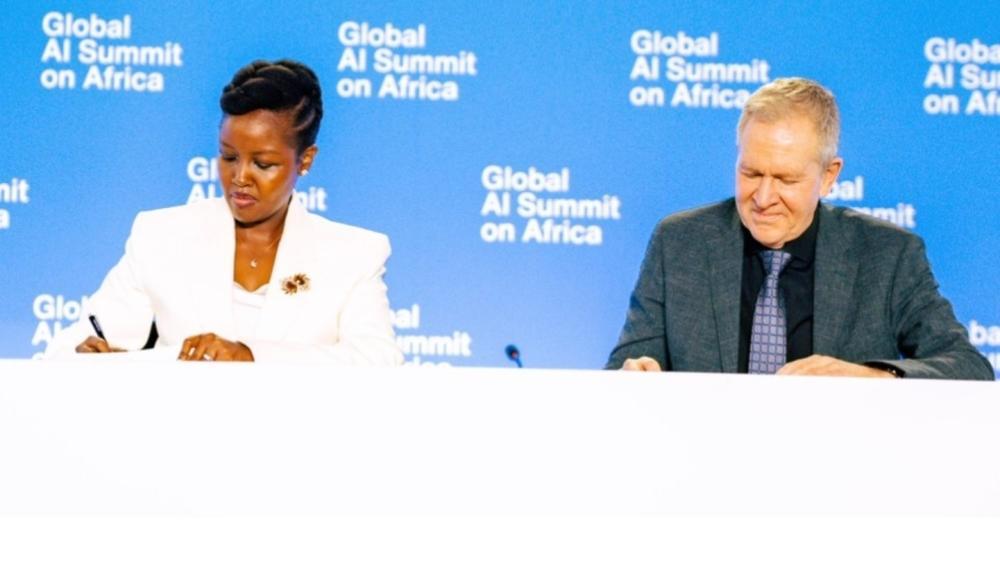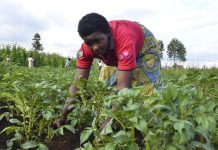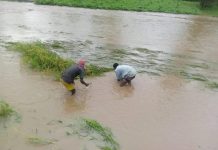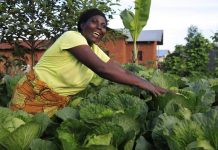Africa-Press – Rwanda. The Government will next year begin implementing the Rwanda AI Scaling Hub, an initiative backed by the Bill and Melinda Gates Foundation with funding now reaching $17.5 million (about Rwf25 billion).
The project aims to accelerate the country’s artificial intelligence (AI) ecosystem through innovations in health, education, and agriculture.
Yves Iradukunda, Minister of State in the Ministry of ICT and Innovation, during an interaction with senators on the role of AI in national development. Courtesy
The update was announced on Thursday, October 16, by Yves Iradukunda, Minister of State in the Ministry of ICT and Innovation, during an interaction with senators on the role of AI in national development.
According to Iradukunda, the Hub will channel part of its budget to support local startups developing AI-driven solutions and expects the first set of applications to be operational next year.
At the Global AI Summit on Africa in April 2025, the Gates Foundation had announced plans for four AI Scaling Hubs across the continent, with Rwanda’s Centre for the Fourth Industrial Revolution under the Ministry of ICT and Innovation chosen to host the first.
The Foundation initially committed $7.5 million over three years, but Iradukunda revealed that the funding has now more than doubled.
“This is a project that will continue to grow, and its budget will increase over time. We appreciate the partnership with the Gates Foundation,” he said.
The Rwanda AI Scaling Hub is designed to accelerate the development and responsible deployment of AI tools that address real-world challenges, especially among underserved populations.
Applications range from AI-powered ultrasound imaging and telemedicine to digital learning and climate-smart farming.
Below are some of the flagship projects under the initiative:
1. AI-powered Telemedicine Services
Developed by Irembo in alignment with government health priorities, this platform seeks to expand access to primary healthcare through remote consultations and digital prescriptions via USSD, voice, SMS, chat, and web.
AI-powered triage will assess symptoms, provide tailored health advice in Kinyarwanda, and guide patients to appropriate care. It targets rural communities, community health workers (CHWs), and low-income patients under Community-Based Health Insurance (CBHI).
2. AI-driven Market Intelligence for Rwanda Medical Supply (RMS)
This project will enhance the efficiency of Rwanda’s health supply chain by using AI for demand forecasting and procurement intelligence. By integrating real-time data, it aims to minimise stockouts, optimise procurement, and ensure timely access to essential medicines.
AI will benchmark prices, evaluate suppliers, and forecast demand based on consumption trends, population data, and electronic medical records. The expected outcomes include cost savings, smarter procurement, and better medicine availability nationwide.
3. AI-enabled Ultrasound Imaging for Maternal Health
To improve early detection of pregnancy complications, the project will deploy AI-powered point-of-care ultrasound (POCUS) tools in primary healthcare facilities.
These tools allow nurses and midwives—with minimal training—to estimate gestational age and identify high-risk pregnancies using simple ultrasound sweeps. The AI system analyses images, estimates fetal parameters, and generates results in under ten minutes, improving maternal and neonatal outcomes in rural areas.
4. AI-powered Agriculture Advisory Services
This system aims to give smallholder farmers, particularly women and youth, access to personalised, real-time farming advice.
By combining AI with agronomic models, it delivers localised recommendations on crop care, pest management, soil nutrition, and market trends—accessible via WhatsApp, SMS, IVR, and agent-mediated channels. The initiative aligns with Rwanda’s Digital Agriculture Strategy and supports climate-smart decision-making at the farm level.
5. AI-based Learning Assessment
This project introduces an AI tool to digitise and automate assessments in primary schools (Grades 1–5) for English and mathematics.
Teachers can upload photos of students’ answer sheets for automatic grading, learning-gap detection, and real-time performance analysis. The tool provides personalised learning recommendations, helps teachers prioritise struggling students, and shares digital report cards with parents.
Drawing from similar systems in India—where 6.23 million assessments were completed in one year—Rwanda expects significant improvements in efficiency and learning outcomes.
“AI can help bridge the teacher-student gap by offering personalised learning support, especially in overcrowded classrooms,” Iradukunda said.
Overall, the AI Scaling Hub will serve as a cross-sectoral platform to nurture local innovation—from prototype to scale—through funding, access to computing resources, and mentorship.
It will also provide policy and regulatory guidance to ensure responsible, inclusive, and sustainable AI adoption across Rwanda’s development sectors.
For More News And Analysis About Rwanda Follow Africa-Press






